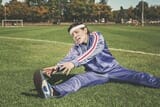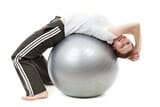Bipolar Disorder And Exercise
Managing bipolar disorder symptoms requires commitment, hard work and medication. Even if you faithfully follow a carefully planned routine, there’s no guarantee that you won’t experience a relapse into the depressive lows and manic highs.
In fact, chances are you will still have to find ways to make it through the day when your bipolar symptoms appear.
While you can’t prevent bipolar depression and mania, making some healthy lifestyle changes might make coping a little easier. According to The Anxiety and Depression Association of America , adding some daily exercise to your normal routine might help the “lows” seem slightly more bearable.
It is important to keep in mind that exercise could potentially cause a manic episode or do little to lessen depression. Talk to your mental health care provider before starting any exercise program.
Exercise and Bipolar Disorder
How can exercising help with bipolar depression?
Firstly, it causes the brain to release endorphins.
Commonly referred to as the “feel good” chemical, when endorphin levels increase your mood is likely to improve. The release of endorphins can also help relieve stress, which can be a trigger for many bipolar disorder suffers.
Even though exercise can increase endorphin levels, there is not any scientific evidence that states it can prevent or relieve bipolar depression. Adding exercise to your routine is just one more tool that could help you control some bipolar symptoms. It should never replace any prescribed medications or other treatments.
Benefits of Exercise
There are other benefits of exercising regularly, other than the boost to endorphin levels.1
Many of the medications used to treat bipolar disorder can cause an increase in appetite and weight gain. This can lead to a loss of self-confidence, which can contribute to or worsen depression. Some of the commonly prescribed medications that can cause side effects include;
- Antidepressants
- Mood stabilizers
- Antipsychotics
- Antidepressant-antipsychotics (e.g. Sybax)
In most cases, it is safe to exercise regularly without worrying about potential interactions. The Mayo Clinic does warn that if you are taking Lithium you will want to refrain from working out, at least until you have spoken to your health care provider. There can be dangerous interactions.
Some of the other benefits exercise can provide include:
- Lower risk of developing osteoporosis
- Improved flexibility
- Muscle strengthening and tone
- Increased level of self-confidence
The Anxiety and Depression Association of America recommends exercising 30 minutes a day, five times a week to see the best results. Always check with your mental health care provider before you dive into an exercise plan. The last thing you want is to trigger a manic or depressive episode.
Can Exercise Trigger Bipolar Mania?
A common fear with exercise and bipolar disorder, is that it could trigger mania. For some bipolar suffers, exercising can become an obsession.
The feeling of power you get when the adrenaline is pumping can be addictive to some people. It’s hard to stop and taking a rest day can make you feel like you are sliding into bipolar depression. You’re convinced that the only way to feel better is to get the endorphin levels back up again.
It can be a real danger, whether you are bipolar or simply a fitness buff to exercise too much. Over-exercising can be just as detrimental to your health, as leading a completely sedentary life. Moderation is key, even when it comes to things that are good for you.
Use your support system and let them know your workout plan, so if you do go overboard someone is there to bring you back to reality. Also, stay in touch with your mental health care provider and let them know if your daily exercise plan is starting to take over your life.
Overcoming 3 Common Exercise Excuses
Even knowing the benefits exercising and living a healthy lifestyle can have, when bipolar depression hits it can be almost impossible to think about doing any kind of structured physical activity.
Bipolar depression is not only emotionally painful, but it can also cause physical aches and pains. Then there is the heavy feeling of lethargy that makes it difficult to even get out of bed. If excuses are the reason for not exercising, here are some tips to help you get moving.
Too tired
Just because it’s recommended that you get in a half hour of physical activity, doesn’t mean that you must follow it to the letter. Simply relax your expectations of yourself. Try for ten minutes, and you might find once the adrenalin kicks in you’re not too tired to keep going.
Feel bad
If you already feel bad, then you have nothing to lose by exercising. If you take it slow and easy, chances are it won’t make you feel worse. Try focusing on how a short workout will improve your mood. It might be the motivation you need to start walking or even just stretching.
Really don’t feel like exercising
When bipolar depression sets in, it’s incredibly easy to say “no” to basically everything. Getting past this default excuse, might be one of the hardest things you do. When the motivation or interest in anything simply isn’t there, it’s difficult to summon up the energy to care about exercising.
Having a workout partner that knows about your bipolar disorder is one method that might help to motivate you, even when you’re depressed. If you prefer exercising alone, consider the reward system. Promise yourself a treat, if you just get in ten minutes of activity.
Managing Bipolar Disorder with Exercise
Exercise won’t cure bipolar disorder nor will it prevent depression. However, it can help you manage your symptoms and possibly make them seem a little less severe.2
The increase in endorphins can help with depression, along with the boost in adrenalin. Exercising regularly will tone muscles and can help you lose some weight. It can also help prevent the weight gain that comes with some bipolar disorder medications. When you look your best and feel healthy, you might experience fewer episodes of depression.
Before starting any exercise program, regardless of its intensity, always speak with your primary mental health provider to ensure that there will not be any adverse interactions.
References:
1https://www.sciencedirect.com/science/article/pii/S0165032714008441
2https://link.springer.com/article/10.1007/s12017-009-8079-9
 Medically reviewed by
Medically reviewed by 


5 Comments
Well that shed some light on the year I obsessively exercised 3 hours a day or more until I damaged my feet quite badly because some stupid sports coach had told me to press on through the pain.
No – if you’re feeling pain, there is a reason & it needs to be investigated.
I then had to resort to exercises that weren’t weight bearing & found they didn’t give me the same rush. Or maybe I was going into a depressive episode. Regardless it was miserable.
I think the exercise really relieved my anxiety, as my anxiety is a constant persistent pain (even medicated). Sometimes when I feel hypomania coming on & the anxiety is terrible I find relief by lying on the grass or the sand at the beach. Its weird I feel all my bubbling electric energy discharge into the ground.
I have done this for years before I was diagnosed with anything, especially when anxiety was unbearable.
There is something very soothing about being one with the earth if only for a few minutes. If you cant lie down take off your shoes & let your feet feel the grass or sand beneath you.
Currently my exercise is regular & not excessive, but I don’t feel right if I don’t do it.
Moderation in everything is key. If you can!
I am majorly depressed after biking 20 miles through rolling hills during a bike tour. I don’t know why. I thought I was supposed to have endorphins. But the depression hit the day after. What is going on?
I love exercise and I could not imagine life without it. I feel more mentally balanced and relaxed after a good sweat. It is one of the single best things that I do for myself in addition to eating healthy, sleeping well, meditation, and choosing healthy relationships. Long term chronic exercise has made a huge difference in my life.
Hey everyone i really apreciate to come here and read your helpful insights, i have Bipolar II all of my life, but for many years i did not know i had this….i suffered a lot, and specially because i had that wrong idea if i get to the gym and exercise a lot it would help me…the true is that my crisis got worst and worst…every bipolar needs to understand how to coop with their crisis because we are all unique….most of all, when i got the right medication i become much much better, but sometimes crisis still come…i learn to do what i can, relax about what i cannot do and i dont put high expectations about exercise….i do short walks and that i feel to help me!!
Thank you thank you thank You! At last, a post that says it as it really is. I am a 5 x London Marathon runner who had a passion for running. It became my best self expression. There was no greater feeling than bouncing out of bed at stupid o’clock, running 10 miles before breakfast and returning like Tigger on springs…….. (sound familiar) then some life changes started to rib me of my best freind (running). It just became another hurdle to climb. I struggled through for a year running 5k every day. As the winter hit anxiety and panic attacks took over. Antidepressants just made it a whole lot worse with really rapid cycling. Eventually, after two suicide attempts I volunteered crisis action.
During this time slot was being said about the benefits of running to relieve depression. It made me angry to listen to this. I felt from experience you can not run from the black dog. If you can, it’s not depression. So stop making ridiculous claims which translate to Depressed people are lazy and just need to get off their buts and excersise.
I began to fear runners high had just been illness and I could never be truly happy.
Thank you for busting this myth.
In October of this year I got news I have a place in next year’s London marathon. It has given me a target but I have not returned to the ecstatic highs I once had. It’s a work out wait and see. I know running will help my physical wellbeing but I am under no illusions of it being some sort of panacea to I’ll health.
Perhaps in hindsight, as with much in life, it’s about running with our black dogs and Triggers, not away from them. I have opened a neew door to enlightenment. Learning from marathon lore tis involves acceptance of the angel on one shoulder and the devil on the other. Accepting both as equal expressions of ourselves…….. Sorry, I’m ranting again. Happiness to all who journey and good luck finding your way home.